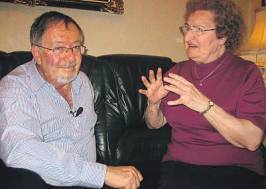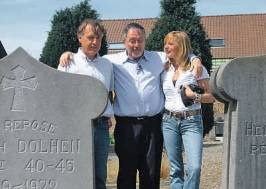”It came seven years too late”
By HENRIQUE CYMERMAN – Special correspondent from Brussels – 05/03/2010
The Materne family, members of Belgian resistance movement, took in an orphan from Spain named Juanito, and a Jewish boy named Zenon.
70-year-old Zenon Zalman Shifer and 80-year-old Paquita Sánchez Manrubia study each other attentively. They caress each other’s faces, dry each other’s tears and drink a toast with their loved ones: ”For Juanito and our family.” The last time they saw each other was in 1945. ”It’s been a long time since I started looking for you in Spain and Belgium, but it’s better late than never,” sighs Shifer.
It all started in the final stages of the Spanish Civil War. Four children from Barcelona: Paquita, Juanito, María and Dolores, who all lost there mothers, were sent to Belgium, to different childless Brussels’ families. ”It looked like a market,” remembers Paquita – ”’Who wants this girl?’ – they would ask, as though it were an auction, and someone would take us.”
It is in this manner that 6-year-old Juanito came into the family of Joseph and Louise Materne, rail workers and members of the resistance. Paquita was adopted by another family.
The year was 1942. On the other end of the city, Sara Fajertag, who had come from Poland 5 years earlier, lost her husband to cancer. The only thing she had left was her 2-year-old son Zenon. The Nazi persecution was intensifying and all Jews that were discovered, were being deported. Despite being alone in the world, Sara decided to try and save the life of her son, and attempted to find a family who would adopt him. She took farewell photos with Zenon and wrote: ”Remember that I was your mother”. There was little time, and she went to a convent to ask for help. Thousands of Jewish children were being saved by the church, but Sara did not want her son to be educated as a Christian. Someone recommended that she talk to the socialist, atheist Materne family. One morning she knocked on the door of 132 Paepsem Street in Brussels. After presenting herself, she begged: ”Would you please take care of my son?” Joseph answers, ”It depends on what Juanito, our adopted son, thinks about it.” Sara and Zenon waited three hours for Juanito to come back from school. ”Juanito, would you like a baby brother,” asked the Matarne family? ”Of course,” answered the child.
”That was how Juanito saved my life,” said Zenon Shifer to this newspaper, at his home in Tel Aviv, a couple of months ago. There were many cases of Spanish and Jewish children that were united by wars. The risk that the Maternes and other adoptive families took was enormous. To be discovered hiding a Jewish child meant the death penalty. To make sure that they wouldn’t be betrayed by Nazi collaborators, the protectors would openly threaten their neighbors, warning that the resistance would enact revenge to any who betrayed them.
After the war, Sara, who managed to survive, returned to Brussels sick and weighing less than 40 kilos. For some years she lived with Zenon close to the Materne family. Later, she went on ”aliyah” to the new Jewish State and contact was lost.
”I have to find Juanito, although I don’t know his last name. My God, we are in the era of internet – this can’t be. I have gone to the Belgian ambassador here in Madrid, international organizations, and the Foret City Council in Brussels. They all told me that the privacy law is preventing them from giving me the information,” said Shifer. On his numerous trips to Belgium, the neighbors told him that the Maternes had died and that Juanito had probably returned to Spain as did the majority of the refugee children.
Zenon Shifer, by now an internationally renowned economist, managed to have his story published in Spain five months ago. ”Juan is my only brother and I have to find him no matter what,” said the 70-yars-old Israeli, emotionally. However, after several weeks of anxious waiting, no information was to be discovered. Not a single clue.
”Soon after, the International Raoul Wallenberg Foundation, who is searching for non-Jews who rescued Jews during the WWII, the righteous among the nations, asked me for permission to investigate the case in Belgium,” he recalls. Its president Baruch Tenembaum and the director Danny Rainer suggested that the Floret City Council deliver a letter to Juanito or his family. ”This way, they can answer if they so wished, and it would not violate their privacy.
After several days, the directors of the Foundation called Shifer. ”We have found three children of Juanito Materne and his sister Paquita, who remembers you quite well. They would like to see you. The sad news is that your brother, who was adopted by Materne family as well, died 7 years ago.” Zenon cried for some time, but immediately announced to his wife and three children: ”Soon, we are going to re-encounter our family.”
Two weeks later, we accompanied the Shifer family on their trip to Brussels. Upon landing, Daniel and Patricia Materne, who had taken the day off to meet them, had tear-filled eyes, yet reacted in the contained, Central-European fashion. Ten minutes later, the Mediterranean warmth of the Shifer family overcame all barriers. Within minutes, they were a family. When they went to the tomb of the Maternes, at the cemetery of the resistance fighters, they were all already hugging.
The Shifer family went to the house of Paquita, an 80-years-old Andalusian-like lady (her parents were from Almeria), who only speaks French. After hugging, and remembering Juanito’s antics and how he and Zenon slept in the same bed, Paquita shared her photo albums. ”Look how many photos we have of you. You were so sweet! For Juanito, you were his baby brother…” They compared the albums and discover exactly the same horse carriage – one photo with Juanito, the other with Zenon.
After a Spanish-style snack, they toasted with champagne. The ”chin chin” of the Materne Sánchez is combined with the ”lehayim” (”to life,” in Hebrew) of the Shifer family. Zenon asked to be taken to Juanito’s grave. ”He has been cremated and his ashes dispersed in the garden. He was a free man,” murmured Daniel, the oldest. Zenon went out into the garden and sighed: ”I have a bittersweet feeling. On one hand I regain the descendants of my brother, but on the other hand I have come to him seven years too late.”
Henrique Cymerman, journalist, writer and speaker. Twice winner OF the New York TV and Film Festival and several times Journalist of the Year in Spain and Portugal. The President of Portugal bestowed on him the distinction ”Comendador of the Order of the Infant Don Henrique”. He won the prize ”Conde de Godo” for his journalistic work. He is the author of the book ”Voces desde el Centro de Mundo” (Voices from the Center of the World), translated into five languages.


